Over the long-term, centering U.S.-Taiwan cooperation on strengthening the attractiveness and competitiveness of Taiwan will pay lasting and significant dividends. This piece originally appeared in the Taipei Times.
Prior to President Donald Trump’s visit to China in November last year, some in Taiwan were concerned that the United States would sacrifice the island’s interests for a “grand bargain” with China over North Korea. Fortunately, those worries never materialized.
Nevertheless, given both President Trump’s unconventional approach to foreign affairs and his casual inconsistency on Taiwan issues following his congratulatory call with President Tsai Ing-wen (蔡英文) in December 2016, such concerns will be hard to fully extinguish.
Given anxieties about Trump’s conviction on Taiwan and Beijing’s steadily intensifying pressure on the island, now would be an opportune time for senior officials in Washington and Taipei to dedicate themselves to identifying and articulating a shared animating purpose for the relationship — a set of principles and priorities that would anchor and give direction to the relationship.
The upcoming unveiling of the American Institute in Taiwan’s new office compound could provide a useful platform for both sides to articulate such a shared affirmative vision for the relationship. First, a quick review of recent events:
Following President Trump’s “state visit plus” to Beijing in November, the Trump administration abruptly shifted its posture on China. Beginning with the White House’s National Security Strategy and carrying through in reports from the Department of Defense and the Office of the United States Trade Representative, the Trump administration described China as a strategic rival and vowed to take a more hard-nosed approach in pushing back against problematic Chinese behavior. As part of such efforts, President Trump has made clear he intends to launch stout unilateral trade actions to compel China to modify its statist economic model and bring about more fair and balanced bilateral trade.
Around the same time, “friends of Taiwan” on Capitol Hill pushed legislation to upgrade U.S.-Taiwan relations, including by supporting naval port calls and encouraging visits by U.S. and Taiwan officials at all levels. Both of these measures are largely symbolic, authorizing and encouraging the president to do things for which he already has authority to act.
Meanwhile, debate over how best to address North Korea’s nuclear and missile programs continues to dominate discussions in Washington. There has been active debate about whether the United States should launch preemptive or preventive military strikes against North Korea. President Trump has warned that “time is running out” for peaceful solutions, given the stubborn pace of Pyongyang’s nuclear and missile advances.
As the United States contends with the real risk of military conflict on the Korean Peninsula and intensifying trade friction with China, now is not a good time for Taipei to be pushing symbolic initiatives to reshape its relations with Washington. Any such lobbying risks being perceived as a sign of Taipei’s tone-deafness to the significant stresses Washington confronts.
The focus for Taiwan now should be on demonstrating it is in lockstep with the United States in confronting its most pressing challenges: denuclearizing North Korea and promoting more fair and balanced trade. Such actions would materially strengthen U.S.-Taiwan ties, which would in turn widen the aperture for the United States to support Taiwan’s efforts to strengthen its economic competitiveness.
In fact, Taiwan already has made admirable moves to cut trade and financial ties with North Korea. It could consider further highlighting its efforts to bring its commercial sea fleet and its banking sector into compliance with all relevant United Nations sanctions, as well as its successes in blocking North Korean efforts to contravene sanctions. Taiwan also could offer technical assistance and training to help its diplomatic allies enforce United Nations–mandated sanctions against North Korea.
On the trade front, Taiwan similarly could take proactive steps to demonstrate it is part of the solution, not the problem. Potential steps could include declaring support for the principle that technology transfer should not be used as a condition for entry into any market. Taiwan also could find ways to highlight its prioritization on protecting intellectual property. Additionally, Taiwan could proactively improve market access for foreign companies as part of a push to kick-start negotiation of an investment agreement with the United States.
At a broader level, the benefits of cooperation will need to be reciprocal in order for cooperation to be enduring. With this principle in mind, both sides could work together to define a sweet spot for both side’s efforts. As an example, both sides could commit to prioritize initiatives that (a) promote the shared interests of the United States and Taiwan, (b) are beneficial on their substantive merits (and are not hollowly symbolic), and (c) do not pick at differences over sovereignty issues. There are a host of possible projects in the fields of trade, investment, education, energy, security, and science and technology that could fit within these parameters.
Such efforts would generate momentum in U.S.-Taiwan relations that realistically could be channeled toward President Tsai’s priority of fostering a thriving, vibrant, innovative economy and society. Over the long-term, centering U.S.-Taiwan cooperation on strengthening the attractiveness and competitiveness of Taiwan will pay lasting and significant dividends. That is where both sides should focus their attention.
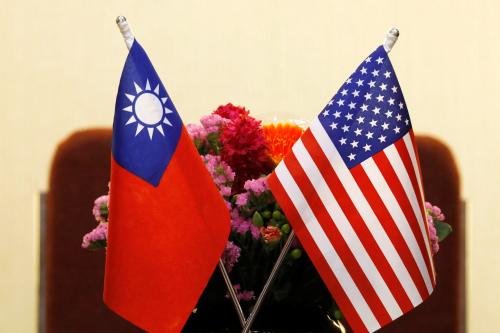
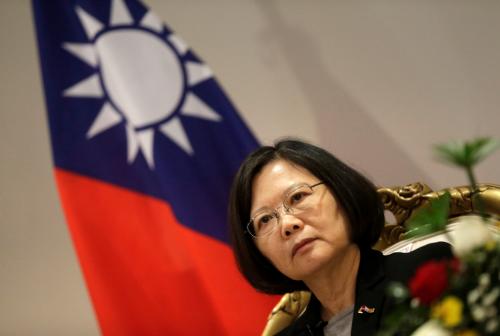
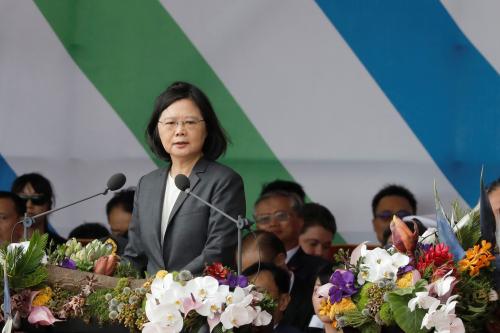
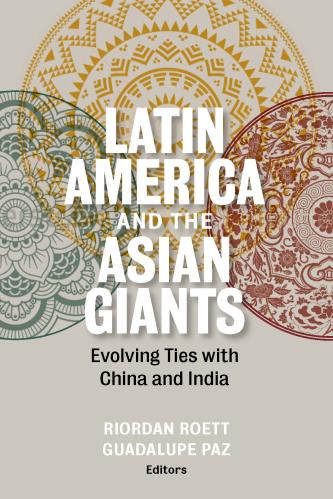
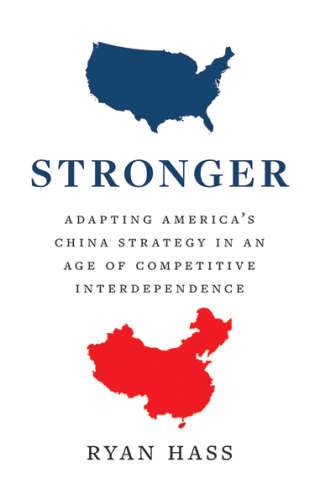




Commentary
Op-edIn U.S.-Taiwan relations, Taiwan should focus on building its competitiveness
February 26, 2018